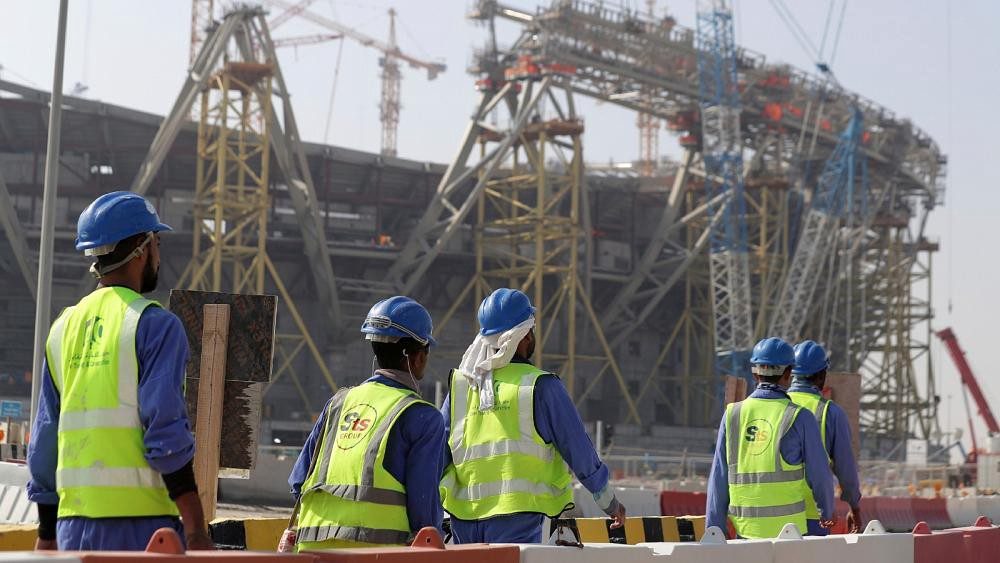Written by Joannah N Zimbe
Migrant workers claim they continue to endure ongoing salary abuse, exploitation and mistreatment as they work on World Cup stadiums and infrastructure projects.
A recent Human Rights Watch report — entitled “‘How Can We Work Without Wages?’: Salary Abuses Facing Migrant Workers Ahead of Qatar’s FIFA World Cup 2022” — has exposed the grim realities facing blue-collar workers in Qatar, despite the nation’s 2017 pledge to meet international labour standards and to tackle the kafala system that’s designed to exploit migrant workers.
Issues highlighted by the report include late wages, poor living conditions, ignored requests for pay, no food allowance and human rights abuses. The report also documents how employees are not empowered to stand up for their rights, having little meaningful help from the government or accountability among their sponsors.
Human Rights Watch spoke to more than 93 migrant workers, employed by some 60 different organisations between January 2019 and May 2020. All reported some form of wage abuse by their employer, such as unpaid overtime, arbitrary deductions, delayed wages, withholding of wages, unpaid wages, or inaccurate wages. Those affected included security guards, servers, bouncers, cleaners, management staff, and construction workers.
Qatar’s economy is reliant on some 2 million migrant workers, who make up around 95 per cent of the country’s total labor force. Most of these come from India, Nepal, the Philippines, Bangladesh, Pakistan, Kenya and Uganda to seek higher wages, despite the fact they are only guaranteed a minimum wage of QAR 750 a month.
Watch now: Viral video shows security guards working under boiling Doha sun
Michael Page, Deputy Middle East and North Africa Director at Human Rights Watch, says:
“Ten years since Qatar won the right to host the … FIFA World Cup 2022, migrant workers are still facing delayed, unpaid, and deducted wages. We have heard of workers starving due to delayed wages, indebted workers toiling in Qatar only to get underpaid wages and workers trapped in abusive working conditions due to fear of retaliation.”

The Human Rights Watch recommended a number of steps to improve conditions, including better wage protection systems, more employer accountability, sanctions imposed on those employers who violate labour laws, and more effort from Qatar government bodies to respond to workers’ complaints.
HRW also challenged the kafala system, under which workers are essentially controlled by their sponsors. Such employers are still responsible for securing, renewing, and cancelling residency permits for migrant workers, and are thus still able to severely restrict workers’ ability to change jobs. Workers also depend on their sponsor for food, housing, transport and annual tickets home.
Meanwhile passport confiscations, high recruitment fees, and deceptive recruitment practices are still ongoing and largely go unpunished.
Response to criticism
Through its main communications office, the Qatar government has denounced the report, claiming it:”…contains repeated inaccuracies around policies and does not reflect the current situation in Qatar,” and that “…nearly all individuals who come to Qatar for employment never experience any form of wage abuse.”
However, they added that they would have worked harder to address issues raised in the report had they known about them.
“Going forward, the government is available to work collaboratively with Human Rights Watch when they have issues related to wage abuse or any other employment concern, as we do with other NGOs,” the Government Communications Office stated.
Read also: “What’s it doing to my children’s lungs?”: Mesaieed residents and the struggle with burning waste
FIFA has also written a response to the report.
An official statement claimed a ‘zero tolerance policy’ towards wage abuse and discrimination. The international sports body stated:
“Through our work to protect the rights of FIFA World Cup workers in Qatar, FIFA and the SC are aware of the importance of wage protection measures in the country and this is why we have put in place robust systems to prevent and mitigate wage abuse on FIFA World Cup sites, as well as mechanisms for workers to raise potential grievances and practices to provide for remediation where companies fail to live up to our standards.
FIFA strongly encourages workers and NGOs who want to raise concerns with respect to FIFA World Cup sites through the SC’s Workers’ Welfare hotline (see here). This will enable the teams on the ground to verify such information and to take appropriate action wherever it is needed, as always in the best interest of respective workers.”
However, as many residents of Qatar will know from first-hand experience, there remains a reluctance by low-paid workers to speak out against their sponsors. Taking employers and their companies to the Ministry of Administrative Development, Labour and Social Affairs can be difficult, costly, time-consuming, ineffective, and can result in retaliation against the worker.
Michael Page said:
“Qatar has two years left before players kick the first ball at the FIFA World Cup. The clock is running out and Qatar needs to show that it will live up to its promise to abolish the kafala system, improve its salary monitoring systems, speed up its redress mechanisms, and adopt additional measures to tackle wage abuse.”
Have you experienced poor treatment or issues with wages due to your employer? Write to us and let us hear your story — [email protected]

![Construction to prepare the World Cup 2022 stadiums is ongoing[Supreme Committee]](https://dohanews.co/wp-content/uploads/2020/08/migrant.jpeg)





